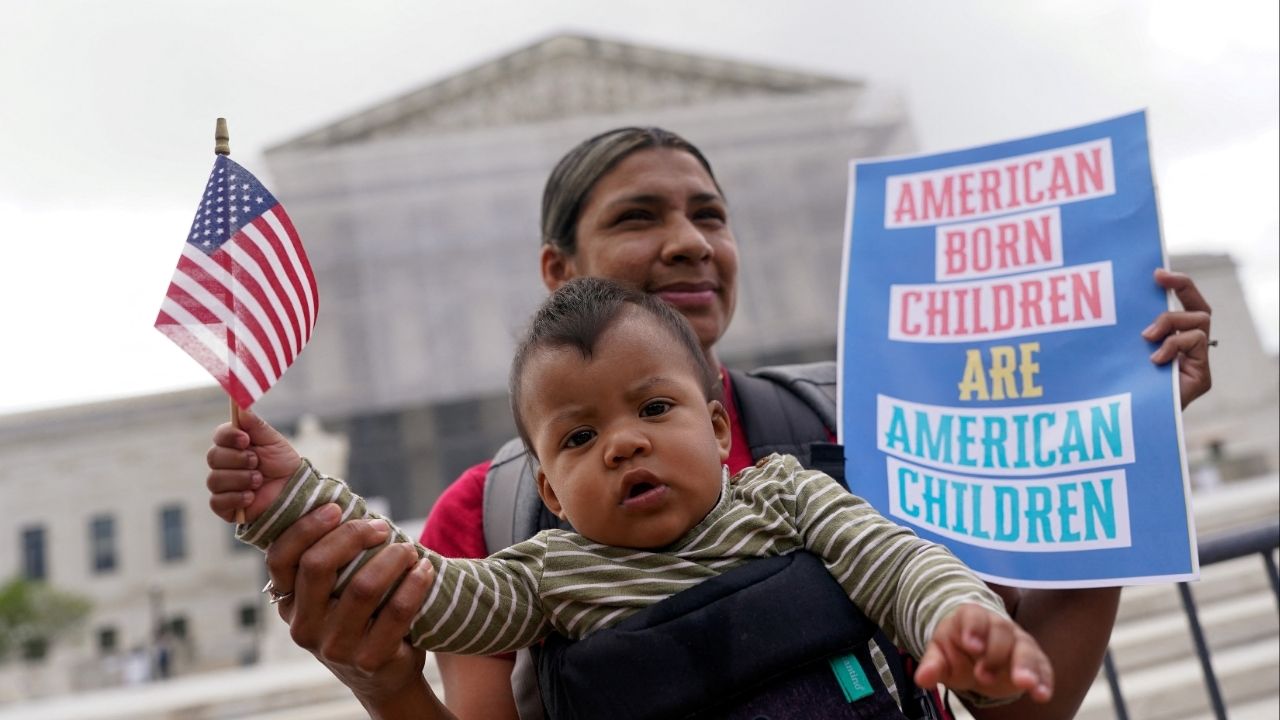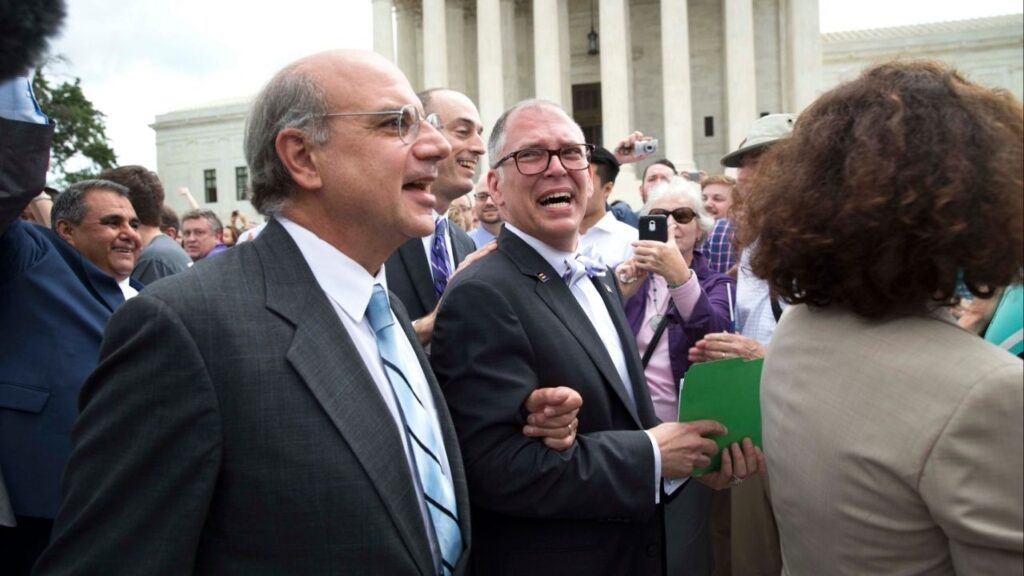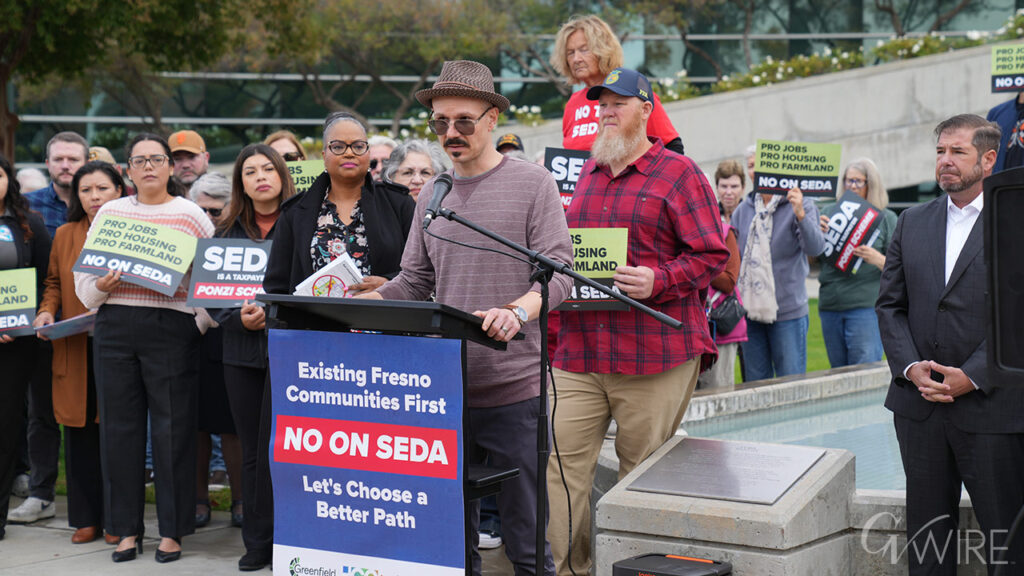Olga Urbina carries baby Ares Webster as demonstrators rally on the day the Supreme Court justices hear oral arguments over U.S. President Donald Trump's bid to broadly enforce his executive order to restrict automatic birthright citizenship, during a protest outside the U.S. Supreme Court in Washington, D.C., U.S., May 15, 2025. REUTERS/Nathan Howard

- The Supreme Court is hearing arguments on Trump’s attempt to end birthright citizenship for children born to non-citizen parents.
- Trump’s lawyers argue judges shouldn’t issue nationwide injunctions; critics say his order violates the 14th Amendment’s citizenship guarantee.
- If upheld, the policy could deny citizenship to over 150,000 babies annually; demonstrators protested outside the court in response.
Share
|
Getting your Trinity Audio player ready...
|
WASHINGTON (Reuters) – The U.S. Supreme Court was hearing arguments on Thursday in Donald Trump’s attempt to broadly enforce his executive order to limit birthright citizenship, a move that would affect thousands of babies born each year as the Republican president seeks a major shift in how the U.S. Constitution has long been understood.
The justices are considering the administration’s emergency request to scale back injunctions issued by federal judges in Maryland, Washington and Massachusetts blocking Trump’s directive nationwide. The judges found Trump’s order likely violates citizenship language in the U.S. Constitution’s 14th Amendment. The arguments were ongoing.
U.S. Solicitor General D. John Sauer, arguing for the administration, told the justices that Trump’s order was “protecting the meaning and value of American citizenship.”
The case is unusual in that the administration has used it to argue that federal judges lack the authority to issue nationwide, or “universal,” injunctions, and have asked the justices to rule that way and enforce Trump’s directive even without weighing its legal merits. Sauer focused on this issue in his opening remarks to the court.
Trump Signed Order on His First Day Back
Trump signed his order, a key part of his hardline approach toward immigration, on January 20, his first day back in office. It directed federal agencies to refuse to recognize the citizenship of U.S.-born children who do not have at least one parent who is an American citizen or lawful permanent resident, also known as a “green card” holder.
The plaintiffs argued that Trump’s directive violated the 14th Amendment, which long has been understood to confer citizenship on almost anyone born on U.S. soil. The 14th Amendment’s citizenship clause states that all “persons born or naturalized in the United States, and subject to the jurisdiction thereof, are citizens of the United States and of the state wherein they reside.”
The 14th Amendment overrode an infamous 1857 Supreme Court decision called Dred Scott v. Sandford that had denied citizenship to Black people and helped fuel the Civil War. The amendment was ratified in 1868 in the aftermath of the Civil War during the post-slavery era in the United States.
“This order reflects the original meaning of the 14th Amendment, which guaranteed citizenship to the children of former slaves, not illegal aliens or temporary visitors,” Sauer told the justices of Trump’s directive.
Sauer said that since Trump returned to the presidency, federal judges have issued 40 universal injunctions against his administration’s policies.
“This is a bipartisan problem that has now spanned the last five presidential administrations,” Sauer said.
Conservative Justice Clarence Thomas agreed with Sauer that universal injunctions “have proliferated over the last three decades or so.”
Sauer said such injunctions exceed judicial power granted under the Constitution’s Article III and disrupt the Constitution’s “careful balancing of the separation of powers” among the judicial, executive and legislative branches of the U.S. government.
“They operate asymmetrically, forcing the government to win everywhere while the plaintiffs can win anywhere. They invert the ordinary hierarchy of appellate review. They create the ongoing risk of conflicting judgments. They increase the pressures on (the Supreme Court’s) emergency docket,” Sauer said.
The court has a 6-3 conservative majority, including three justices appointed by Trump during his first term as president.
Trump’s order was challenged by Democratic attorneys general from 22 states as well as individual pregnant immigrants and immigrant rights advocates. The administration is seeking to narrow the injunctions to apply only to the individual plaintiffs and the 22 states, if the justices find the states have the required legal standing to sue. That could allow the policy to take effect in the 28 states that did not sue, aside from any plaintiffs living in those states.
More than 150,000 newborn children would be denied citizenship annually if Trump’s order is allowed to stand, according to the plaintiffs.
Demonstrators Gather
Supporters of birthright citizenship, as it has been traditionally understood, gathered outside the Supreme Court, with some wielding banners with slogans such as “Birthright Citizenship is a Constitutional Right” and “Hands Off Birthright Citizenship.”
The administration contends that the citizenship clause does not extend to immigrants in the country illegally or immigrants whose presence is lawful but temporary, such as university students or those on work visas.
The Justice Department has argued that these people are not subject to the “political jurisdiction” of the United States because their primary allegiance is to foreign countries.
Automatic birthright citizenship encourages illegal immigration and “birth tourism” by expectant mothers traveling the United States to give birth and secure citizenship for their children, the Justice Department said.
Universal injunctions have become increasingly contentious and have been opposed in recent years by both Republican and Democratic administrations. Judges often have impeded Trump’s aggressive use of executive orders and other initiatives this year, sometimes employing universal injunctions.
The plaintiffs and other critics have said Trump’s directive is the quintessential example of a case in which judges should retain the power to issue universal relief, even if that power is curtailed by the Supreme Court.
An 1898 U.S. Supreme Court ruling in a case called United States v. Wong Kim Ark long has been interpreted as guaranteeing that children born in the United States to non-citizen parents are entitled to American citizenship.
Trump’s Justice Department has argued that the court’s ruling in that case was narrower, applying to children whose parents had a “permanent domicile and residence in the United States.”
—
(Reporting by Andrew Chung, John Kruzel and Blake Brittain in Washington; Editing by Will Dunham)



















